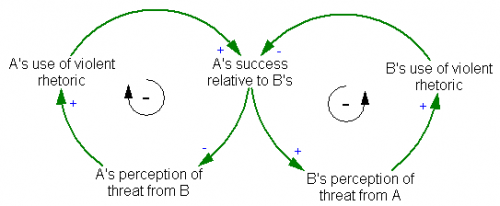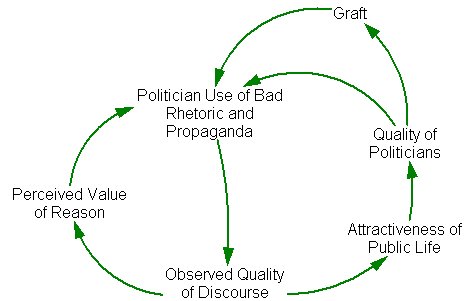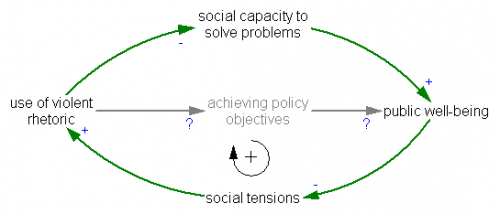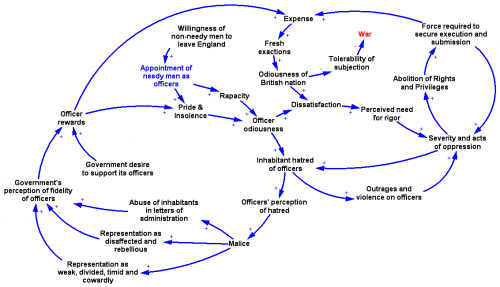There’s simple, as in Occam’s Razor, and there’s simple, as in village idiot.
There’s a noble tradition in economics of using simple thought experiments to illuminate important dynamics. Sometimes things go wrong, though, like this (from a blog I usually like):
… suppose that you have the choice of providing gruesome rhetoric that will increase the probability of a killing spree but will also increase the probability of the passage of Universal Health Insurance. Suppose using the Arizona case as a baseline we say that the average killing spree causes the death of 6 people. Then if your rhetoric is at least 6/22,000 = 1/3667 times as likely to produce a the passage of universal health insurance as it is to induce a killing spree then you saved lives by engaging in fiery rhetoric.
http://modeledbehavior.com/2011/01/11/the-optimal-quantity-of-violent-rhetoric/
Here’s the apparent mental model behind this reasoning:
![]() It’s linear: use violent rhetoric, get the job done. There are two problems with this simple model. First, the sign of the relationships is ambiguous. I tend to suspect that anyone who needs to use violent rhetoric is probably a fanatic, who shouldn’t be making policy in the first place. Setting that aside, the bigger problem is that violence isn’t linear. Like potato chips, you can never have just one excessive outburst. Violent rhetoric escalates, and sometimes crosses into real violence. This is the classic escalation archetype:
It’s linear: use violent rhetoric, get the job done. There are two problems with this simple model. First, the sign of the relationships is ambiguous. I tend to suspect that anyone who needs to use violent rhetoric is probably a fanatic, who shouldn’t be making policy in the first place. Setting that aside, the bigger problem is that violence isn’t linear. Like potato chips, you can never have just one excessive outburst. Violent rhetoric escalates, and sometimes crosses into real violence. This is the classic escalation archetype:
 In the escalation archetype, two sides struggle to maintain an advantage over each other. This creates two inner negative feedback loops, which together create a positive feedback loop (a figure-8 around the two negative loops). It’s interesting to note that, so far, the use of violent rhetoric is fairly one-sided – the escalation is happening within the political right (candidates vying for attention?) more than between left and right.
In the escalation archetype, two sides struggle to maintain an advantage over each other. This creates two inner negative feedback loops, which together create a positive feedback loop (a figure-8 around the two negative loops). It’s interesting to note that, so far, the use of violent rhetoric is fairly one-sided – the escalation is happening within the political right (candidates vying for attention?) more than between left and right.
There are many other positive feedbacks involved in the process, which exacerbate the direct escalation of language. Here are some speculative examples:
 The positive feedbacks around violent rhetoric create a societal trap, from which it may be difficult to extricate ourselves. If there’s a general systems insight about vicious cycles, it’s that the best policy is prevention – just don’t start down that road (if you doubt this, play the dollar auction or smoke some crack). Politicians who engage in violent rhetoric, or other races to the bottom of the intellectual barrel, risk starting a very destructive spiral:
The positive feedbacks around violent rhetoric create a societal trap, from which it may be difficult to extricate ourselves. If there’s a general systems insight about vicious cycles, it’s that the best policy is prevention – just don’t start down that road (if you doubt this, play the dollar auction or smoke some crack). Politicians who engage in violent rhetoric, or other races to the bottom of the intellectual barrel, risk starting a very destructive spiral:

The bad news is that there’s no easy remedy for this behavior. Purveyors of violent rhetoric and their supporters need to self-reflect on the harm they do to society. The good news is that if public support for violent words and images reverses, the positive loops will help to repair the damage, and take us closer to a model of rational discourse for problem solving.
About that, there is at least a bit of wisdom in the article:
… if you genuinely care about the shooting death of six people then you ought to really, really care about endorsing wrong public policies which will result in the premature death of vastly more people. Hence you should devote yourself to actually discovering the right answers to these questions, rather than than coming up with ad hoc rhetoric – violent or polite – in support of the policy you happend to have been attracted to first.

